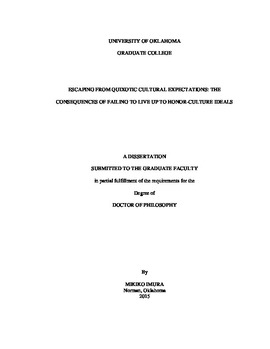| dc.contributor.advisor | Brown, Ryan | |
| dc.contributor.author | Imura, Mikiko | |
| dc.date.accessioned | 2015-04-24T20:58:21Z | |
| dc.date.available | 2015-04-24T20:58:21Z | |
| dc.date.issued | 2015-05 | |
| dc.identifier.uri | https://hdl.handle.net/11244/14446 | |
| dc.description.abstract | Past research showed the heightened suicide and depression rates in the U.S. culture of honor regions compared to non-honor regions. The present research investigated the psychological processes by which men in honor cultures might reach suicidal inclinations by applying the framework of self-discrepancy theories and the escape theory of suicide. Study 1 showed that participants who strongly endorsed honor ideology but believed they did not live up to such ideals (i.e., those who experienced a gap between the cultural ideals and their current selves) showed a heightened sense of burdensomeness – one of the most powerful predictors of suicidality. Study 2 manipulated the salience of this gap by priming the honor ideals while inducing a state of heightened self-awareness. Those who were reminded of the honor standards and strongly endorsed such standards showed a modest tendency toward heightened suicide-related thought activation when they were forced to compare themselves to the standards via the self-awareness manipulation. | en_US |
| dc.language | en_US | en_US |
| dc.subject | Psychology, Social. | en_US |
| dc.title | Escaping From Quixotic Cultural Expectations: The Consequences of Failing to Live Up To Honor-Culture Ideals | en_US |
| dc.contributor.committeeMember | Showers, Carolin | |
| dc.contributor.committeeMember | Carvallo, Mauricio | |
| dc.contributor.committeeMember | Song, Hairong | |
| dc.contributor.committeeMember | Damphousse, Kelly | |
| dc.date.manuscript | 2015-04-22 | |
| dc.thesis.degree | Ph.D. | en_US |
| ou.group | College of Arts and Sciences | en_US |
